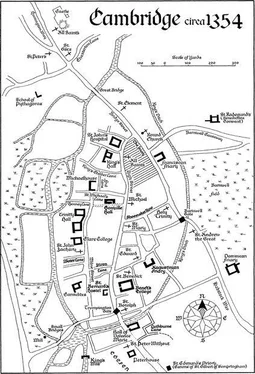Ringstead left to do his bidding, while Bartholomew sat in a seat in the window and stared across the Dominicans’ yard. The rain had stopped, but there were deep puddles everywhere, the surfaces of which wrinkled and shivered as the breeze played across them. He turned when he heard a soft tap at the door, and was surprised to see Clippesby ease himself through it.
The recent unrest had told on the Michaelhouse Fellow. His hair stood up in a wild halo around his tonsure, and Bartholomew suspected that he had been tearing at it. His eyes seemed unfocused, and he wore the serene smile that usually preceded some of his more peculiar antics. The scholars at Michaelhouse were growing used to Clippesby’s eccentricities, and many of the students and masters barely noticed them any more. But the friary was less tolerant, and Bartholomew had the impression that they would have been happier if Clippesby did not pay them such regular visits.
‘What are you doing here, Clippesby?’ demanded Morden, none too pleasantly. ‘Do not tell me that the pig has been giving you its philosophical opinions again?’
Clippesby smiled, his peculiar eyes shifty. ‘The pig is convinced that nominalism is a more rational theory. She is a true Dominican in her beliefs.’
If Bartholomew had not known that Clippesby was verging on insanity, he would have suspected the man of playing a game with Morden. But Clippesby’s face was a picture of earnest innocence and there was no humour there. Bartholomew heard Michael give a snort of laughter.
‘What do you want, then?’ snapped Morden, glaring at Michael as well as Clippesby. ‘Can you not see that I am busy?’
‘I came to tell you that someone has put paint all over poor Kyrkeby’s face,’ said Clippesby helpfully. ‘Someone has made him look like a prostitute.’
‘You can take him with you when you go, as well as Kenyngham,’ said Morden nastily to Michael. ‘I will not allow the Dominican Friary to become a venue for Michaelhouse eccentrics, who are probably here only because Michaelhouse is too poor to afford fires.’
‘Michaelhouse is a cold place,’ agreed Clippesby. ‘But that will not matter soon.’
‘Why?’ asked Michael suspiciously. ‘You are not thinking of setting it alight, are you? I know that would solve our heating problems, but it would also render us all homeless.’
Clippesby glared at him. ‘Do you think I am mad; that I would do something to damage the place where I live? All I am saying is that this cold weather will break in three days, and that Easter will be sunny and warm.’
‘Really,’ said Morden flatly. ‘And how do you know this?’
‘My voices told me,’ said Clippesby serenely. ‘And the river ducks confirmed it this morning.’
‘The man believes he is St Francis of Assisi,’ muttered Morden, regarding Clippesby as he might something he had trodden in on the High Street. ‘Can you not lock him away, Brother? I do not think he should be allowed to roam where he pleases. He may do himself some harm – and he is a danger to those on whom he foists his peculiar ideas.’
‘I am not some dog to be tethered just because you are too insensitive to hear the sounds of nature,’ said Clippesby angrily. ‘You are so ensconced in your own troubles and your own comforts, that you cannot hear the Earth speaking to you.’
‘Hello, Clippesby,’ said Ringstead pleasantly, entering the chamber again with a huge armful of clothes and Kyrkeby’s chest. ‘You were wrong about the cow, by the way. She did not have twins.’
‘But she told me she would,’ said Clippesby, puzzled.
‘Are these Kyrkeby’s belongings?’ asked Michael, changing the subject from one that promised to be increasingly bizarre, if Clippesby were to play a part in it. ‘Can you tell if there is anything missing, Prior Morden?’
‘His scrip is not here,’ said Ringstead, watching Morden sift through Kyrkeby’s jewellery with predatory eyes. ‘I should have noticed it was missing when you last came.’
‘Then we must assume it was stolen,’ said Michael. ‘Has anything else gone?’
Morden selected an emerald ring and held it up to the light. It was huge in his tiny hands. ‘This is nice. It is a pity it is so large.’
‘It is not too large for me,’ said Ringstead, slipping it on to his middle finger and admiring it.
‘It looks valuable,’ said Michael, taking Ringstead’s hand and inspecting the jewel minutely. ‘Many people would commit murder in order to get something like this.’
‘Murder?’ echoed Ringstead, startled and pulling his arm away from Michael. ‘Are you telling us that Kyrkeby was murdered ?’
‘The Carmelites!’ exclaimed Morden, outrage mounting. ‘They did it – not for a ring, but to avenge themselves for Faricius’s death, despite the fact that we are totally innocent of it.’
‘Our students will riot when they hear about this,’ vowed Ringstead. ‘They will tear down the Carmelite Friary stone by stone!’
Michael gave a heartfelt sigh of irritation. ‘There is no evidence that anyone murdered Kyrkeby. And I thought you wanted to keep the details of his death to yourselves. Do you really want to accuse the Carmelites of murder, and have it revealed that your Precentor died decorated like a whore?’
Morden swallowed hard. ‘Of course not. But at the same time, we cannot stand by and see one of our most beloved masters killed in cold blood and do nothing about it.’
‘No one is asking you to do nothing,’ said Bartholomew reasonably. ‘You are helping the proctors to investigate, which is the best way to establish what really happened.’
‘Kyrkeby was a dull man,’ announced Clippesby bluntly. ‘He was not the kind of person anyone would want to kill, even if he did paint his face. Are you sure he was murdered?’
‘It is possible,’ said Michael calmly, as though he were discussing the weather and not the brutal death of the Dominicans’ second-in-command. ‘As I said, I intend to discover how he died and why, which I can only do if you co-operate. Now, was Kyrkeby involved in anything we should know about?’
‘No,’ said Morden. He closed his eyes for a moment, deep in thought, and then shook his head. ‘No. His main task was ensuring the proper liturgy was chanted in our offices, and he seldom left the friary, except to go to church.’
‘And you say that nothing, other than his scrip, is missing from his belongings?’ pressed Michael.
Morden sighed. ‘I cannot be certain, but I thought he had more rings than this. One or two may be missing.’
‘He must have been wearing them, then,’ reasoned Michael.
‘Oh, yes,’ said Morden, bitterly. ‘He was probably wearing them when he painted his face to make himself look like a woman.’
‘When precisely did you last see him?’ asked Bartholomew. ‘You said he was supposed to supervise the students on Saturday when they marched on the Carmelites, but that he was avoiding his duties because he wanted to spend more time on his lecture. When was he first missed?’
‘Monday evening,’ said Ringstead. ‘You had been tending him all that afternoon, and at dinnertime – after you had gone – I took him a bowl of soup. He was not in his room, and I could not find him anywhere in the friary. I was worried, because I could not understand why he had abandoned his lecture so suddenly – especially since it was going so well.’
‘No one here recalls seeing him after dusk on Monday,’ summarised Morden. ‘I suppose he must have slipped out when no one was looking.’
‘That makes him sound furtive,’ pounced Michael. ‘Why do you say he “slipped” out?’
Morden gave an expressive shrug. ‘It seems he “slipped” out to indulge his inclination to daub himself with women’s paints, Brother. How else would you have me put it?’
Читать дальше












